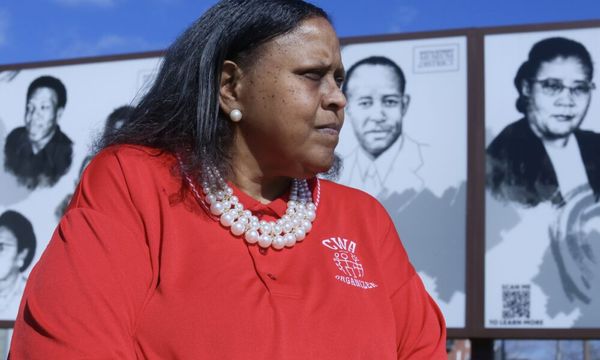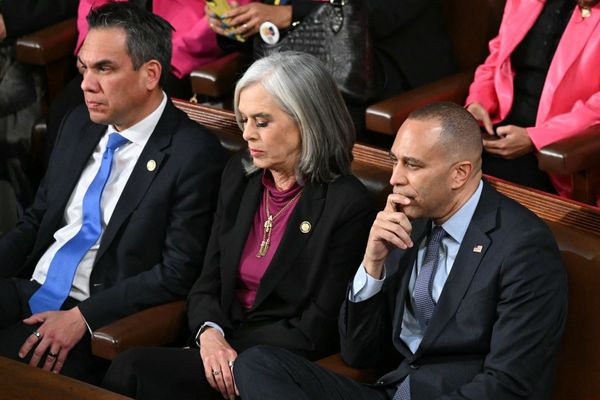
When Face the Nation moderator Margaret Brennan came back from maternity leave in September for the start of the 2021-2022 TV season after giving birth to her second son, one significant change to CBS’s storied Sunday morning news franchise was impossible to miss. The 67-year-old program (which hits that milestone on Sunday, November 7) now had an extra name, baked right there into the title: Face the Nation With Margaret Brennan.
It was as clear a pronouncement that CBS could offer — that the identity of its consistently top-rated Sunday morning show is inextricably linked with the veteran business and foreign affairs journalist who’s moderated it since 2018. And who, more important, is unique among her peers. Both in terms of her style (“If you’re looking for anger and outrage for the sake of it? That’s not what you’ll find here,” she told me) as well as her background. The latter includes her coverage of Wall Street, the financial crisis and global markets — beats she focused on for a decade before coming to CBS from Bloomberg Television and CNBC before that.
And the show isn’t even the entirety of her professional identity. Upon her return, Margaret was also upped to CBS News’ chief foreign affairs correspondent and quickly scored an interview with Turkish President Recep Tayyip Erdogan in New York about his relationship with President Biden, the situation in Syria, and more. Also for CBS News, Brennan’s interviews with foreign leaders have included UK Prime Minister Boris Johnson, then-Israeli Prime Minister Benjamin Netanyahu, French President Emmanuel Macron, Irish Prime Minister Michael Martin, and King Abdullah II of Jordan.
That kind of track record is a big part of why Face the Nation is able to book so many heads of state and CEOs — with an example of the latter including FedEx
Meanwhile, the fact that Brennan is also the only woman and working mother to helm her own Sunday morning news show? Yet another fresh perspective she brings to a program that’s produced consistent ratings leadership for CBS.
“I think personal experience always changes someone’s perspective and informs their journalism on any story, right?” Brennan told me. “We’ve talked a lot in this country about lived experiences, and certainly I think for many people one of the most relatable ones is what’s happening with their children — certainly now, in a crisis with the pandemic.
“We just saw the FDA greenlight for elementary school kids a vaccine, so we’re getting closer on one of the last segments of our population. But for my kids, I’m going to have to be waiting well into 2022, and I'm going to be experiencing this pandemic still with them, in a way that some of the country won’t. Because I will still have unprotected children, since they’re just not eligible yet. It puts it into more real terms for me.”
Brennan parlays all of that into a politics and public affairs program that’s resonating with viewers. Data from Nielsen, for example, shows that, on October 31, Face the Nation was the #1 Sunday morning show in its category. It also earned top marks for both total viewers (2.8 million) as well as for the most viewers among adults aged 25-54 (546,000).

In an interview with me ahead of the 67th anniversary episode on Sunday, Brennan opened up about how she works behind the scenes, the state of journalism today — and her deceptively simple formula for Face the Nation.
“I think people, particularly in a moment of national crisis, look for context,” she said. “And for perspective that’s not just about opinion. So it’s not just about banging my chest to make it about me. Because it’s not about me. It’s about trying to get to the heart of the matter. I think people are looking for that. I think people are looking for information they can trust.”
That starts with corralling newsmakers and a sampling of the biggest players influencing national and world events. For the October 31 edition of the show, Brennan sat down with US Secretary of State Antony Blinken, who answered questions about US negotiations over Iran’s nuclear program as well as global climate efforts and the collapse of Afghanistan. US Secretary of Commerce Gina Raimondo, meanwhile, was also on hand to discuss the US supply chain meltdown, while a pair of congressmen discussed the president’s stalled domestic agenda in Congress, including the $1.2 trillion bipartisan infrastructure bill which the House of Representatives passed this week.
“Supply chains around the world have been massively disrupted over the past few months,” Brennan asked Raimondo at one point during the broadcast. “We have all of these bottlenecks. Why haven't the ports, why haven't the truckers, why hasn't this become unstuck?”
Replied the Commerce Secretary: “This isn't something that can be fixed overnight. But the important thing is, fundamentally, supply chains and logistics are run by the private sector. People say to me, will Christmas gifts be delivered? To which I say, call FedEx. That isn't what the government does.
“What we are doing, and the president is committed to this, we're using every tool in our toolbox to be supportive, to help, to unstick the ports.”
Brennan’s previous interviews with newsmakers including scientists during the height of the coronavirus pandemic helped Face the Nation land two Emmy Award nominations. And in addition to helping garner the most viewers in its category during the 2020-2021 TV season, this year Face the Nation also won first place in the National Headliner Awards category for broadcast and cable coverage of a continuing news event — that event being the pandemic. The judges went so far as to note that the show gave viewers coverage that was “exactly what the country needed at the time.”
Continued Brennan: “I’ve joked that doing a live TV show from the floor of the New York Stock Exchange and getting jostled around and covering financial crises and figuring out the economy and how politics and policy all fit together — all of that, I think, has been really useful to me in coming to the moment we’re in now. Where we’re pulling those threads together. Responding in the moment sometimes, but also turning away from breaking news and asking, well, where does this take us next?”
When that process is repeated often enough, thoughtfully enough, it may very well prove a bulwark against the some of the mainstream media abandonment that jaded consumers have exhibited in recent months and years. Recent data from the Pew Research Center underscored that trust in the mainstream media among Republicans continues to essentially fall off a cliff. Overall, according to Pew, about six-in-ten U.S. adults (58%) say they have at least some trust in the information that comes from national news organizations. That’s still clearly a majority, but a worrisome figure nevertheless.
Because it’s also smallest share recorded over the past five years that Pew has been polling members of the public over this same issue.
“There’s a lot of anger bubbling in the country, and a lot of it has been directed at journalists,” Brennan told me. “There’s a place you can choose to go if you want an opinion. I mean, you don’t even really have to choose it. It’ll land in your lap these days.”
The idea is that at Face the Nation, “you’ll find a conversation that says, okay, what is the issue at the heart of this, and how do we wrestle it to the ground. Or, how do we deal with this crisis that we’re facing. Because I think there’s maybe too much of the politics-as-bloodsport and not enough of the policy and not enough conversation about the really deep issues our country is struggling with.”







